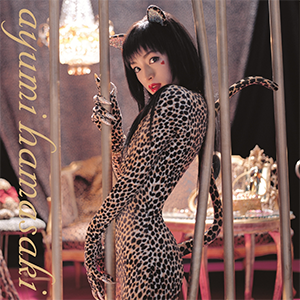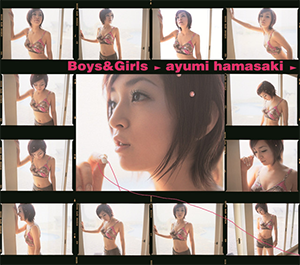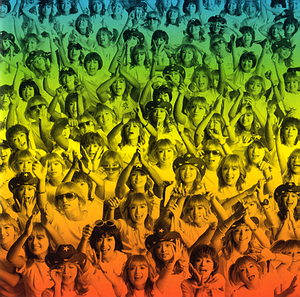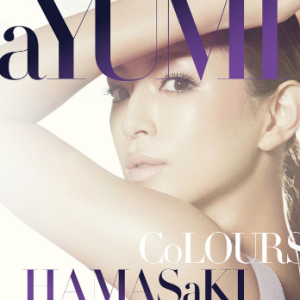
Loveppears is the second studio album by Japanese recording artist Ayumi Hamasaki. It was released in Japan, Hong Kong and China on November 10, 1999, through Avex Trax and the China Record Corporation, and distributed worldwide on April 10, 2001, by Avex Entertainment Inc. It was entirely written by Hamasaki herself, while the production was handled by Japanese musician Max Matsuura. Musically, Loveppears is a dance album and lyrically focuses on themes of love, frustration of life, loneliness, and individualism.

Duty is the third studio album by Japanese recording artist Ayumi Hamasaki. It was released on September 27, 2000, by Avex Trax. Duty is Hamasaki's first studio album inside the 2000 decade, and her third consecutive studio album to be fully produced by Japanese musician and businessman Max Matsuura. The album's composing and arrangement was handled by several music collaborators, such as Ken Harada, Kazuhito Kikuchi, Dai Nagao, HΛL, among many others. Hamasaki contributed to the album as the primary and background vocalist, and songwriter to every song. Three different formats were released to promote the album: a standalone CD, a limited edition Playbutton, and a digital download. The cover sleeve has Hamasaki wearing a leopard-print cat suit.

A Best is the first greatest hits album by Japanese singer-songwriter Ayumi Hamasaki. It was released on March 28, 2001, by Avex Trax and Avex Music Creative Inc. Hamasaki had originally planned to release the greatest hits album after her 2002 studio album I Am..., but the idea was denied by Avex head staff. Instead, Avex released the album in 2001, which caused conflict between the label and Hamasaki. The compilation was released in two different formats including a physical and a digital release. Seven different artworks were released in several editions of the album. The album includes one new track, three re-recorded tracks, and the rest of previously released singles.

"Surreal" is a song by Japanese recording artist Ayumi Hamasaki, taken from her third studio album Duty (2000). It was written by Hamasaki and produced by Max Matsuura. The song is a rock with elements of alternative rock. "Surreal" describes Hamasaki's madness and sense of confusion, while the themes of "Surreal" are based on Hamasaki's concept of loneliness, chaos, confusion, and the burden of her responsibilities, aimed mostly toward her public image as a recording artist. It was released as the fourth single from the album on 27 September 2000 by Avex Trax and Avex Taiwan.

"Whatever" is a song recorded by Japanese recording artist Ayumi Hamasaki for her second studio album, Loveppears (1999). It was written by Hamasaki, while production was handled by Max Matsuura. The track is Hamasaki's sixth single with Matsuura since her debut single in April 1998, "Poker Face". "Whatever" premiered on February 10, 1999 as the lead single from the album. It was re-released on February 28, 2001 as a CD single.

"To Be" is a song by Japanese recording artist Ayumi Hamasaki. It served as the third single from Hamasaki's second studio album Loveppears (1999). The track was released by Avex Trax in Japan and Taiwan on May 12, 1999, and through Avex Entertainment Inc. worldwide in September 2008. It was Hamasaki's final single to be distributed as a Mini-CD, a format that debuted at the start of her career in April 1998. "To Be" was written by Hamasaki herself, while production was handled by long-time collaborator Max Matsuura. Musically, it is a J-Pop that was written in third person perspective, much like the content from the parent album.

"Boys & Girls" is a song recorded by Japanese recording artist Ayumi Hamasaki, serving as the fourth single for her second studio album, Loveppears (1999). It was released by Avex Trax in Japan and Hong Kong on July 14, 1999, and through Avex USA in North America in early 2001, while being re-distributed in 2003. "Boys & Girls" marks Hamasaki's first single to be made available for purchase as a maxi single with additional remixes. The track was written by the singer herself, while production was handled by long-time collaborator Max Matsuura. Musically, the song is a dance recording, a genre that heavily influences Loveppears. The single's lyrical content is written in third-person perspective.

A is an extended play (EP) by Japanese recording artist Ayumi Hamasaki. It was released by Avex Trax in Japan and Hong Kong on August 11, 1999, in 10 different editions, and through Avex Entertainment Inc. worldwide in September 2008. It additionally served as a single from her second studio album Loveppears (1999), and is her first single marketed as an EP. The 12-track EP contains four new original songs: "Monochrome", "Too Late", "Trauma", and "End Roll", and eight remixes. All songs were written by Hamasaki, while production was handled by long-time collaborator Max Matsuura.

"Appears" is a song recorded by Japanese recording artist Ayumi Hamasaki. It was released by Avex Trax on November 10, 1999 as the sixth single from her second studio album Loveppears (1999), which was released on the same day. Alongside this, it has been released in several other territories with different release dates under her Western alias Ayu. It also served as Hamasaki's first limited edition single, limiting physical sales to 300,000 copies. The track was written by Hamasaki herself, while production was handled by long-time collaborator Max Matsuura. Musically, "Appears" is a dance song written in third person perspective, and is about the third person watching what appears to be a happy and loving relationship. Upon its release, "Appears" received positive reviews from music critics. Alexey Eremenko, writing for AllMusic, selected the track as the best song from the album and her career. However, an editor from CD Journal criticized the amount of remixes on the CD single.

"Kanariya" is a song recorded by Japanese recording artist Ayumi Hamasaki for her second studio album, Loveppears (1999). It was released by Avex Trax in Japan and Hong Kong on December 8, 1999, and through Avex USA in North America in early 2000. The recording also served as Hamasaki's second limited edition single, with limited physical units of 300,000 copies. The track was written by Hamasaki herself, while production was handled by long-time collaborator Max Matsuura. Two versions of "Kanariya" were made available for consumption—a radio edit produced by American disc jockey Jonathan Peters, and the album version composed by Yasuhiko Hoshino. Lyrically, the song was written in third person perspective.

"Fly High" is a song recorded by Japanese recording artist Ayumi Hamasaki. It was released by Avex Trax in Japan on February 9, 2000, and through Avex Entertainment Inc. worldwide in September 2008. The recording served as Hamasaki's third and final limited edition single from her second studio album, Loveppears (1999), limiting physical units to 300,000 copies. The track was written by the singer herself, while production was handled by long-time collaborator Max Matsuura. Two versions of "Fly High" were made available for consumption—a radio edit composed by HΛL, and the album version produced by Dai Nagao. Lyrically, the song was written in third person perspective.

"Vogue" is a song recorded by Japanese recording artist Ayumi Hamasaki for her third studio album, Duty (2000). It was written by Hamasaki, while production was handled by Max Matsuura. It premiered on April 26, 2000 as the lead single from the album. Her third consecutive lead single to be produced by Matsuura, the song is part of a trilogy from Duty; the other two singles being "Far Away" and "Seasons".

"Far Away" is a song recorded by Japanese recording artist Ayumi Hamasaki for her third studio album, Duty (2000). It was written by Hamasaki, while production was handled by Max Matsuura. It premiered on May 17, 2000, as the second single from the album. The song is part of a trilogy from Duty; the other two singles being "Vogue" and "Seasons".

"Seasons" is a song recorded by Japanese recording artist Ayumi Hamasaki for her third studio album, Duty (2000). It was written by Hamasaki, while production was handled by Max Matsuura. It premiered on June 7, 2000 as the third single from the album. The song is the final part of a trilogy from Duty; the other two singles being "Vogue" and "Far Away".

"Audience" is a song by Japanese recording artist Ayumi Hamasaki from her third studio album Duty (2000). It was released as the album's fifth and final single on 1 November 2000 by Avex Trax. Hamasaki wrote the track and Max Matsuura Lewis produced it. Dai Nagao and HΛL composed both the single and album version. The single artwork was shot by Japanese photographer Toru Kumazawa and features duplicate clones of Hamasaki, resembling an audience. Musically, "Audience" is a dance–pop and disco song.

Rock 'n' Roll Circus is the eleventh studio album by Japanese recording artist Ayumi Hamasaki. It was released on April 14, 2010, by Avex Trax. It was also released just a little over a year after her 2009 album, Next Level. Rock 'n' Roll Circus marks Hamasaki's eleventh consecutive album to be fully produced by Japanese producer and manager Max Matsuura, while she contributes to the album as the lead vocalist, background vocalist, and songwriter to all songs. Recorded in Japanese with minor phrases in English, Rock 'n' Roll Circus is a rock album with numerous musical elements such as electropop, J-pop, rock, pop ballad, and dance music.

"Feel the Love" is a song recorded by Japanese recording artist Ayumi Hamasaki. It was released in six different formats on December 25, 2013 by Avex Trax, Avex Taiwan, and Avex Entertainment Inc. worldwide. It was also her first physical release in three years since her EP–single L (2010), and her first double A-side single, alongside the track "Merry-Go-Round", since "Moon" and "Blossom" that same year. The track was written by the singer, whilst production was handled by Japanese musician and long-time collaborator Max Matsuura with the assistance of DJ Hello Kitty; this marks the singer's first single to be produced with another producer outside of Matsuura. Musically, "Feel the Love" is an electronic dance song that lyrically focuses on love and having a good time.

Colours is the fifteenth studio album by Japanese recording artist Ayumi Hamasaki. It was released on July 2, 2014, in Japan by Avex Trax, worldwide by Avex Entertainment Inc., and on July 18 in Taiwan by Avex Taiwan. The songs on the album were entirely written by Hamasaki, while production was led by long-time collaborator Max Matsuura; it also included a variety of Western producers such as Armin van Buuren, members from RedOne Productions De Paris and Rush, Darkchild, and Fedde Le Grand, among others. This became Hamasaki's first studio album to have not been fully produced by Matsuura, and her first album to incorporate a large amount of English language. Musically, Colours is an electronic dance music album.

Made in Japan is the seventeenth studio album by Japanese recording artist Ayumi Hamasaki. It initially debuted on the streaming service AWA Japan on May 11, 2016, before receiving a physical and digital release on June 29, 2016. It is Hamasaki's seventeenth consecutive studio album, since her debut album A Song for ×× (1999), to be fully written by her and produced by Japanese musician Max Matsuura. Musically, the album encompasses a variety of genres including hard rock, ballad, and electronic dance music.

"Merry-Go-Round" is a song recorded by Japanese recording artist Ayumi Hamasaki, featuring a rap section delivered by Japanese artist Verbal, for the singer's fifteenth studio album Colours (2014). It was released worldwide in six different formats on December 25, 2013 by Avex Trax, Avex Taiwan, and Avex Entertainment Inc. It was also Hamasaki's first physical release in three years since her EP–single L (2010), and her first double A-side single, alongside the track "Feel the Love", since "Moon" and "Blossom" that same year. The track was written by Hamasaki, whilst production was handled by Japanese musician and long-time collaborator Max Matsuura with the assistance of M-Flo; this marks Hamasaki's first single to be produced with another producer outside of Matsuura. Musically, "Merry-Go-Round" is an electronic dance song that includes guitars and synthesizers in its instrumentation.
















